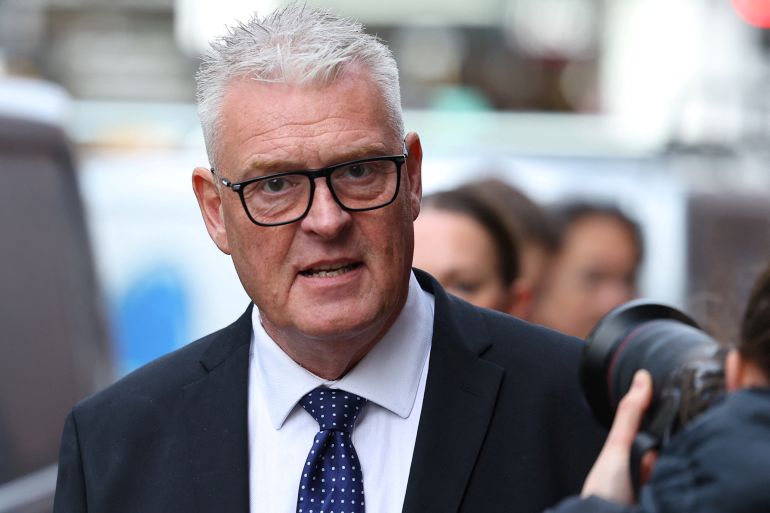Why is the UK’s Conservative Party facing a firestorm over Islamophobia?
One MP has been suspended for suggesting that London’s mayor was being controlled by ‘Islamists’.

The United Kingdom’s prime minister is facing mounting pressure to crack down on Islamophobia in his party after Conservative Member of Parliament Lee Anderson caused outrage by asserting that “Islamists” had “got control” of Labour’s London Mayor, Sadiq Khan.
Rishi Sunak described Anderson’s comments, which the legislator made last Friday on the right-wing TV channel GB News, as “wrong” and subsequently suspended him from the Conservative Party when Anderson refused to apologise.
Keep reading
list of 4 itemsGeorgia’s ‘foreign agents’ bill: What’s the controversy about? What’s next?
Nakba remembered: What is the right of return?
Boeing’s jets turn 70: A timeline of highs, lows and turbulence
But the prime minister has so far declined to address accusations that the Conservative Party, which has governed the UK since 2010, is rife with anti-Muslim bigotry.
Sadiq Khan described the remarks by Anderson as “pouring fuel on the fire of anti-Muslim hatred” while Conservative Party peer Baroness Sayeeda Warsi said the UK prime minister had to “find the language” to “call Islamophobia Islamophobia”.
Opposition leader Keir Starmer, who resolved to root out the “poison” of anti-Semitism in the Labour Party when he took over in April 2020, also weighed in on the row, accusing Sunak of lacking a “backbone” to tackle the issue.

Does the UK Conservative Party have an Islamophobia problem?
Some commentators and analysts say that Anderson’s comments are indicative of a Conservative Party trend in this regard.
In August 2018, Boris Johnson, who had then recently quit as the UK’s foreign secretary before becoming prime minister in July the following year, used his column in the right-wing newspaper, the Daily Telegraph, to opine that Muslim women wearing full-face veils “look like letter boxes” while comparing their appearance to “bank robbers”.
Four years later, Conservative MP Nusrat Ghani claimed a government whip had informed her that she had lost her job as a transport minister in early 2020 because her status as a “Muslim woman minister” was making colleagues “uncomfortable”.
And earlier this month, Suella Braverman, the UK’s hard-right former home secretary, appeared to fan the flames of Muslim hate when she wrote in The Telegraph: “The truth is that the Islamists, the extremists, and the antisemites are in charge now.”
How has Sunak reacted to allegations of Islamophobia?
Sunak has doubled down on his assertion that the Conservative Party does not have a problem with Muslims.
“No, of course it doesn’t,” Sunak told Radio York on Monday after he was asked whether his party had Islamophobic inclinations. “And I think it’s incumbent on all of us, especially those elected to Parliament, not to inflame our debates in a way that’s harmful to others.”
On Tuesday, however, political analyst Peter Oborne wrote in Middle East Eye that Sunak’s reluctance to call out Islamophobia in his party was actually a “ruthless political calculation” based on the next UK general election, which must be held no later than January 28, 2025, but could take place this year.
“With the economy in recession, public finances a mess and the [Conservatives’] reputation for competence at rock bottom, all the evidence suggests that Sunak’s [party] will fight the election by targeting minorities – especially immigrants and, in particular, Muslim ones,” he said.
Oborne added, “This explains Sunak’s weak and complicit reaction to this week’s outbursts of Tory bigotry.”
How has Anderson responded to the furore?
Anderson has steadfastly refused to apologise for his comments about the London mayor, which he made when GBNews – which employs him as a presenter – asked the politician to respond to Braverman’s assertions in the Telegraph.
Because of his suspension, Anderson now sits as an independent MP for the constituency of Ashfield, Nottinghamshire in the House of Commons. He said his comments concerned what he called “disgusting” pro-Palestine protests outside Parliament and his assertion that Mayor Khan was “not in control of the streets of London”.
On Tuesday, Anderson told the UK’s Channel 4 news that “dozens of Tory MPs [have] texted me saying ‘you’ve done nothing wrong’” as he attempted to defend himself against accusations of racism by stating, “Islam is not a race of people, so how can I be racist?”
Speculation is now rife that Anderson is considering defecting to the UK’s right-wing populist Reform Party, which was co-founded by British Eurosceptic Nigel Farage as the Brexit Party in 2018.
What does this row reveal about the modern UK today?
Sunak, a practising Hindu, pointed to his own position as the UK’s first British Asian prime minister to refute suggestions that Anderson’s remarks spoke to a wider problem of racism in the UK.
“We’re a proud multi-ethnic democracy, one of the most successful anywhere in the world,” said Sunak. “I am standing here as living proof of that and it’s important that we work hard to protect that, because that’s one of the things that makes our country incredibly special.”
But Tim Bale, a politics professor at Queen Mary University of London, told Al Jazeera that the UK’s “increasingly multicultural, multi-ethnic society” was “something many people – particularly older white people who left school early and live in places where there are still comparatively few ethnic minority residents – find hard to acknowledge, even hard to stomach”.
However, he added, “But let’s not overstate things … The vast majority of Brits just want to be left in peace to get on with their lives.”